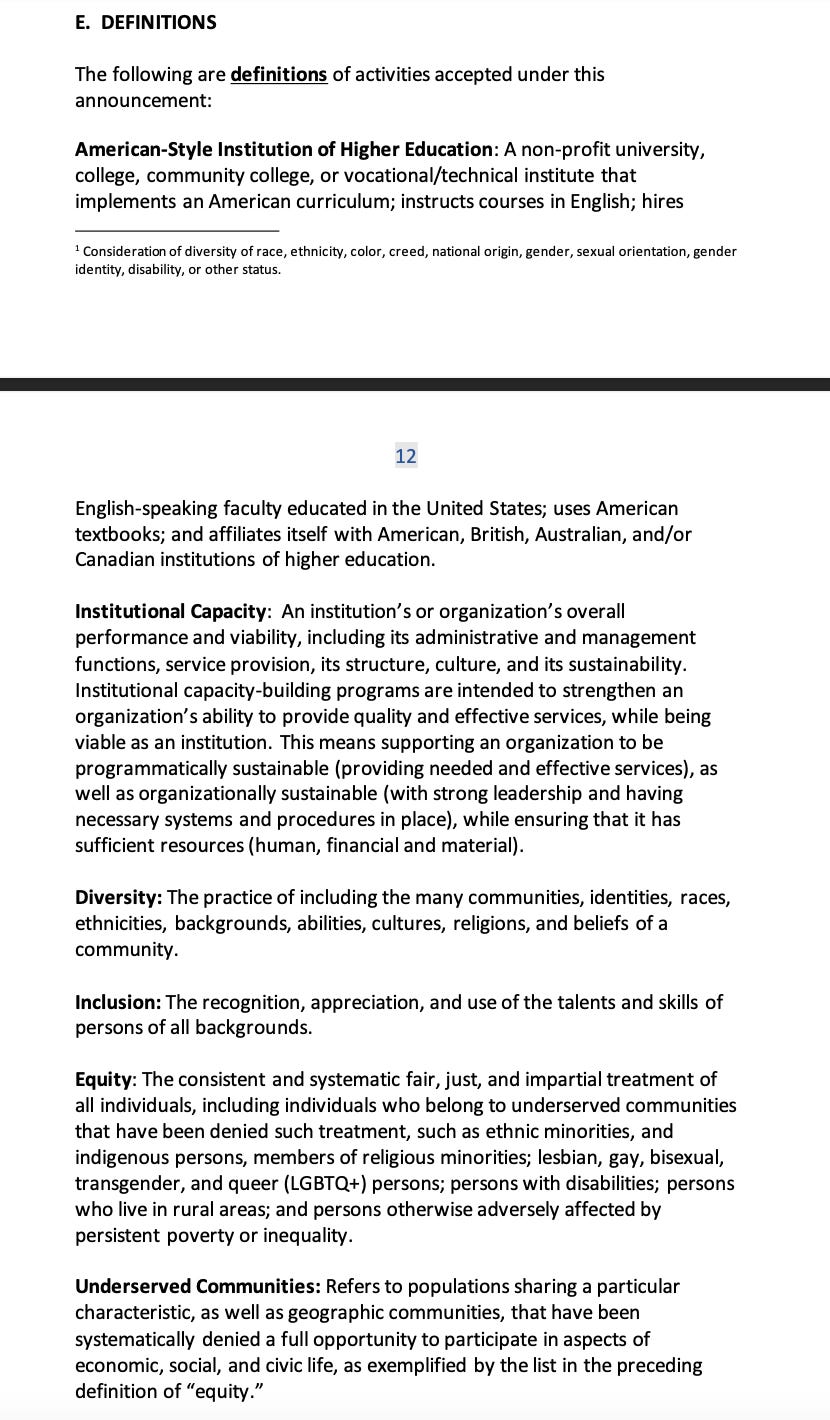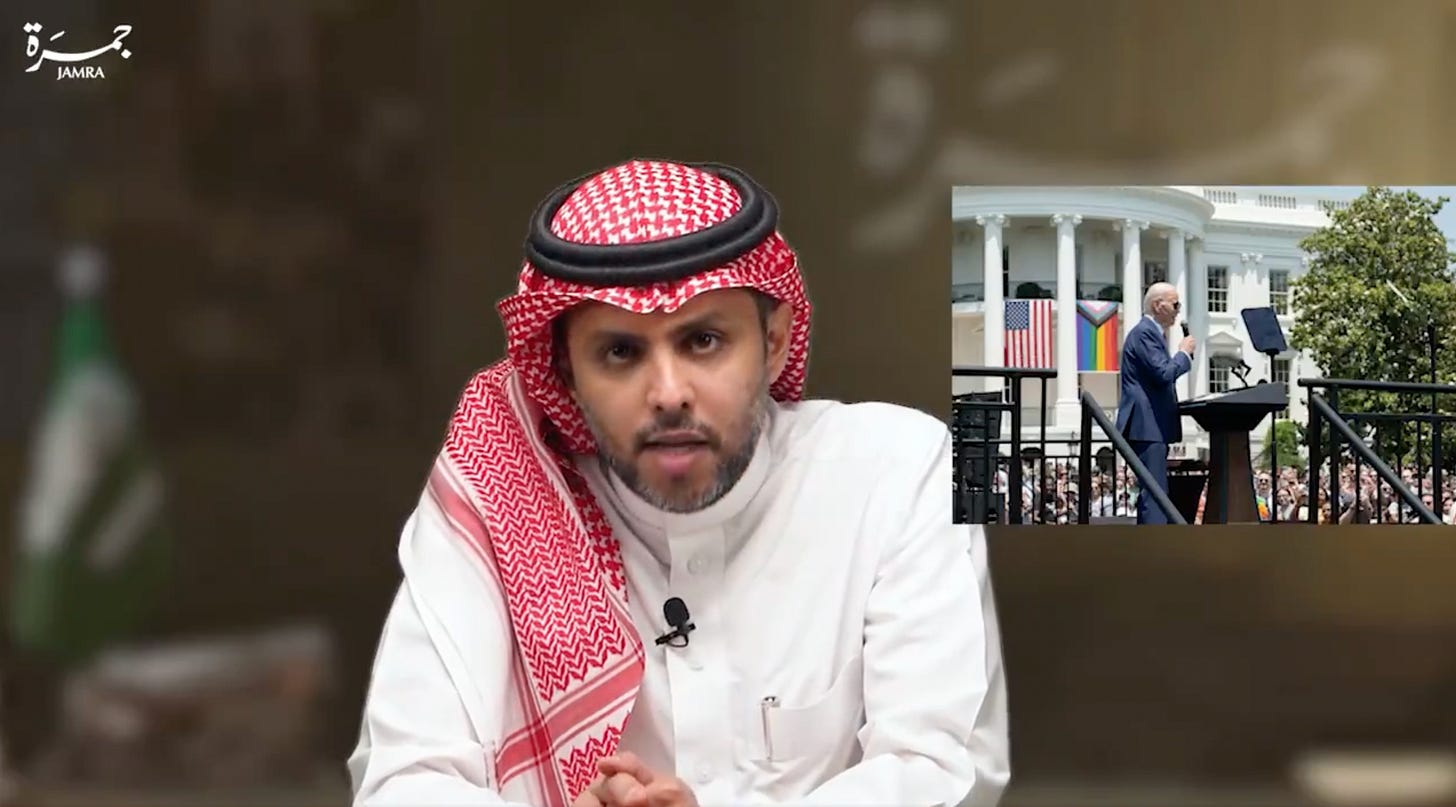We're All Living in America: Saudi anti-LGBT Disinfo Edition
Middle Eastern and American right-wing political cultures are converging.
Saudi media close to the government is pushing a homophobic disinformation campaign against the Biden administration. The journalists are falsely claiming that Biden declared America “the nation of the gays,” causing nationwide protests; and that the State Department offered money for Iraqi universities to push “homosexuality.”
These claims have caught on in Arab media far outside Saudi Arabia’s borders.
The campaign leans on right-wing American media. One Saudi journalist explicitly cited the Free Beacon, and echoed talking points from First Things and Tablet Magazine.
There’s a lot going on there. I wrote about a report on the campaign itself for Responsible Statecraft. Here, I want to make a few points about the significance of the story. On one hand, it’s an example of disinformation spreading through language barriers; on the other hand, it’s an example of how political cultures around the world are getting Americanized.
My Fulbright research project1 was originally to research the spread or creation of misinformation through English-to-Arabic translation. It turned out to be a much smaller problem than expected; Arab journalists are very good at dealing with foreign media. So the project has since become a broader exploration of how media crosses borders and languages.
And I’ve soured on the idea of “disinformation studies,” which often means “propaganda we don’t like.”
There is a growing “counter-disinfo” industry made of Westerners who monitor Russian or Iranian propaganda. And there’s an older “counter-extremism” industry dedicated to monitoring Islamist media. There’s much less interest in monitoring hateful and untrue propaganda pushed out by U.S. partners, or the U.S. government itself.
I came across the Saudi reports on Biden by accident, while looking for Arabic coverage of Muslim-American protests against Pride Month. The campaign I found is a classic case of “disinformation.” A political actor is pushing a false claim across a variety of media outlets. And, as I originally set out to research, it was disinformation about the English-speaking world.
The fake Biden quote and the rumors of protests had little to do with translation issues; they spread the same way that American misinformation about America does. Saudi journalist Hussain al-Ghawi tweeted the claim with no source, a bunch of people retweeted it without checking, and suddenly it was being reported as fact.
The claim about Iraqi universities did involve a game of translation telephone. The U.S. State Department is offering a grant to expand liberal arts education in Iraq. Because the funding had boilerplate language about diversity, the Free Beacon reported that Biden was paying to spread “gender ideology” in Iraq. Al-Ghawi translated it as “curriculum on homosexuality.”
(In an email, the Free Beacon’s editor-in-chief told me that she stood by her publication’s reporting.)
Those are big and dangerous leaps; Iraqis have been arrested or killed for “promoting homosexuality.” It’s hard to explain those leaps to an audience that isn’t steeped in American political debate — the idioms of overweening liberal bureaucrats and right-wing attack-dog journalists.

Even so, something about the Free Beacon’s concerns translated into Middle Eastern political culture. It’s the same thing I observed in Iraqi Kurdistan: a non-Islamist Muslim conservatism. Rather than the language of old-school political Islam, the prophetic mission and the clash of civilizations, Middle Eastern conservatives have been appealing to tradition and identity in ways that American conservatives can relate to.
Saudi Arabia’s social reforms are happening along those lines. The clergy are being reigned in and the Saudi middle class is being allowed to have the same lifestyle that Arab and Middle Eastern middle classes have taken for granted. At the same time, the government has emphasized the importance of protecting the social order from both Islamists and feminists.
These reforms have impressed a lot of American hawks who used to see Saudi Arabia as the Muslim heart of darkness. (It’s always ironic when the Western right attacks Muslims for being too conservative.) Because its image was so “backwards” before, very small reforms make Saudi Arabia look positively cutting-edge.
The kingdom has done an especially good job wooing Republican elites, by lavishing the Trump administration with flattery and money, and by playing up the common U.S.-Saudi-Israeli rivalry with Iran. Now that Saudis provide an example of “good” Muslims, they are allowed to make common cause with American conservatives against “gender ideology.”
All of which distracts from the things that Americans should be paying attention to. Saudi Arabia’s social stances are for Saudis to figure out, and mostly affect Saudi citizens. The kingdom’s foreign policy, the way Saudi Arabia tries to dominate the Middle East while hiding behind U.S. military power, is everyone else’s business.
Saudi Arabia used to have a reputation for using its oil money to pump out Islamist incitement. The messages have changed, but the Saudi dominance of Arab and Muslim media hasn’t gone away. “Infidels” are no longer acceptable targets; liberals and “deviants” still are.
As a friend put it: “it would be pretty wild if an effect of the Abraham Accords was to get a lot of autocracies to stop saying ugly and insane things about Jews and start saying ugly and insane things about gays.”
The views expressed here do not represent the views of the Fulbright Program, the U.S. Department of State, or any of its partner organizations.



